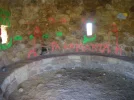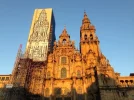That is, of course, hyperbole and not expected of any pilgrim. It is expected that I will take food and drink. It is expected that I will leave money and, um, "used food and drink". They say that pilgrims often leave things behind at albergues for pilgrims following behind. It is expected that such things will be taken (and left).
And, of course, on the
Camino Frances, it is 100% acceptable, if not expected, to leave a stone at the Cruz de Ferro.
That's like asking "Why would you want to walk to Santiago de Compostela? Just take a bus there."
In this case, it is a metaphor. A linkage of the physical to the spiritual. You burden yourself physically to represent a spiritual burden that you are carrying. Then, when you unburden yourself of the physical object, the spiritual burden is metaphorically left behind.
That seems very understandable. That's why I was asking is there's a generally accepted place on the Camino Portuguese for such a thing, as opposed to just imposing my wants onto the rest of the universe.
As it seems that there really is no such place, I think I shall scribe my burdens onto a piece of paper or some such thing, and carry that with me throughout my journey, eventually burning it in Finisterre (where I understand there a steel bowls set up for such burnings).



























